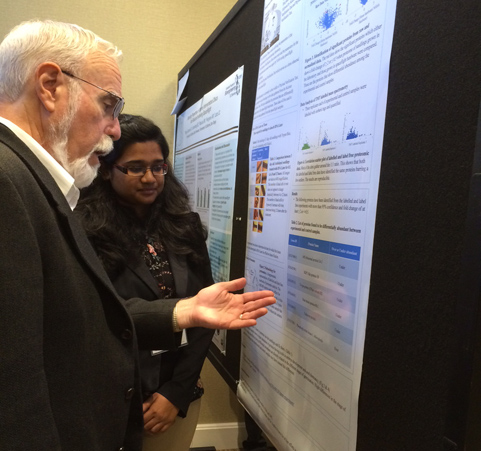Graduate student Proma Basu presented a poster on studying the proteins plants express as they are exposed to gravitational changes in spaceflight and upon reorientation to the Earth’s gravitational pull on Oct. 25 at the American Society for Gravitational and Space Research.
Her co-author on Proteomics Analysis of Plants Subjected to Modification in the Gravity Vector was Dr. Sarah E. Wyatt, Professor of Plant Biology at Ohio University. Basu is a doctoral student on Wyatt’s Team Gravitron. Read more about their experiment that will fly on the International Space Station.
Abstract: Proteins are the work horses of the cell. Changes in the genome of any organism manifest themselves through the differential expression of proteins. Although gene expression studies provide information on the genes expressed, they do not provide the full picture.
After transcription the RNA generated may get translated to proteins or degraded. Resulting proteins may also be regulated by post-translational modification.
The aim of this study is to identify quantitative and qualitative differences in proteins expressed either to reorientation on Earth or to the spaceflight environment.
Arabidopsis Wild Type Columbia seeds have been subjected to the gravity persistent signal treatment, which focuses on the events of signal transduction or prepared for a spaceflight experiment. Proteins were extracted from the appropriate tissues, digested with trypsin overnight, and labeled with iTRAQ 4-plex reagents. The resulting control and experimental samples were combined and subjected to LC MS/MS. The MS/MS spectra were compared to the data in cRAP_20110301 and TAIR10 database to identify the proteins and the modifications on the proteins.
Proteins identified with more than 80 percent confidence from the peptide sequences are considered valid. The log fold change in expression of the proteins identified and the differences in post translational modifications between experimental and control samples may help to further identify components of the signal network involved in response to gravity.
This research is supported by NSF IOS #1147087 and NASA # NNX13AM48G to SEW.




















Comments